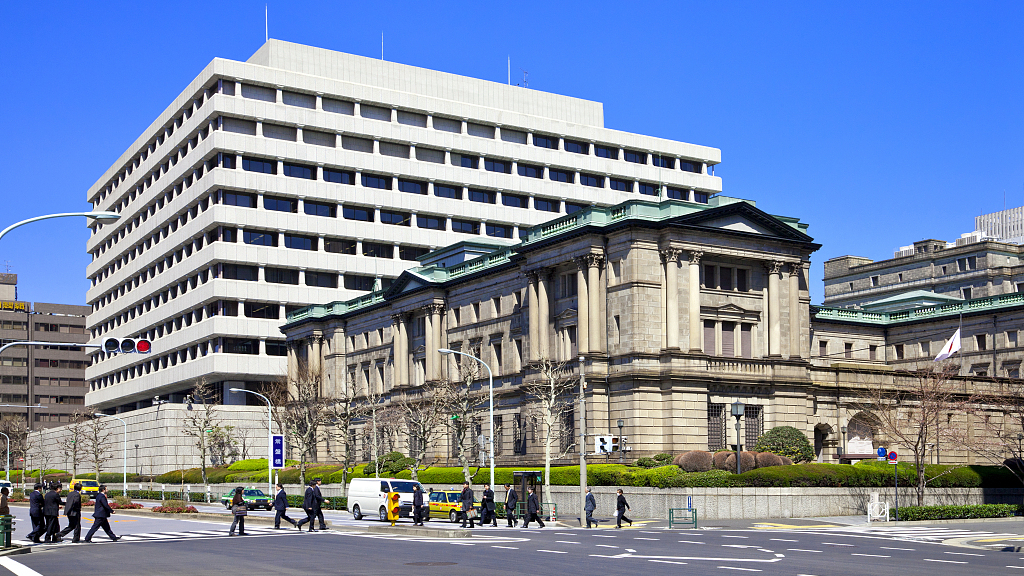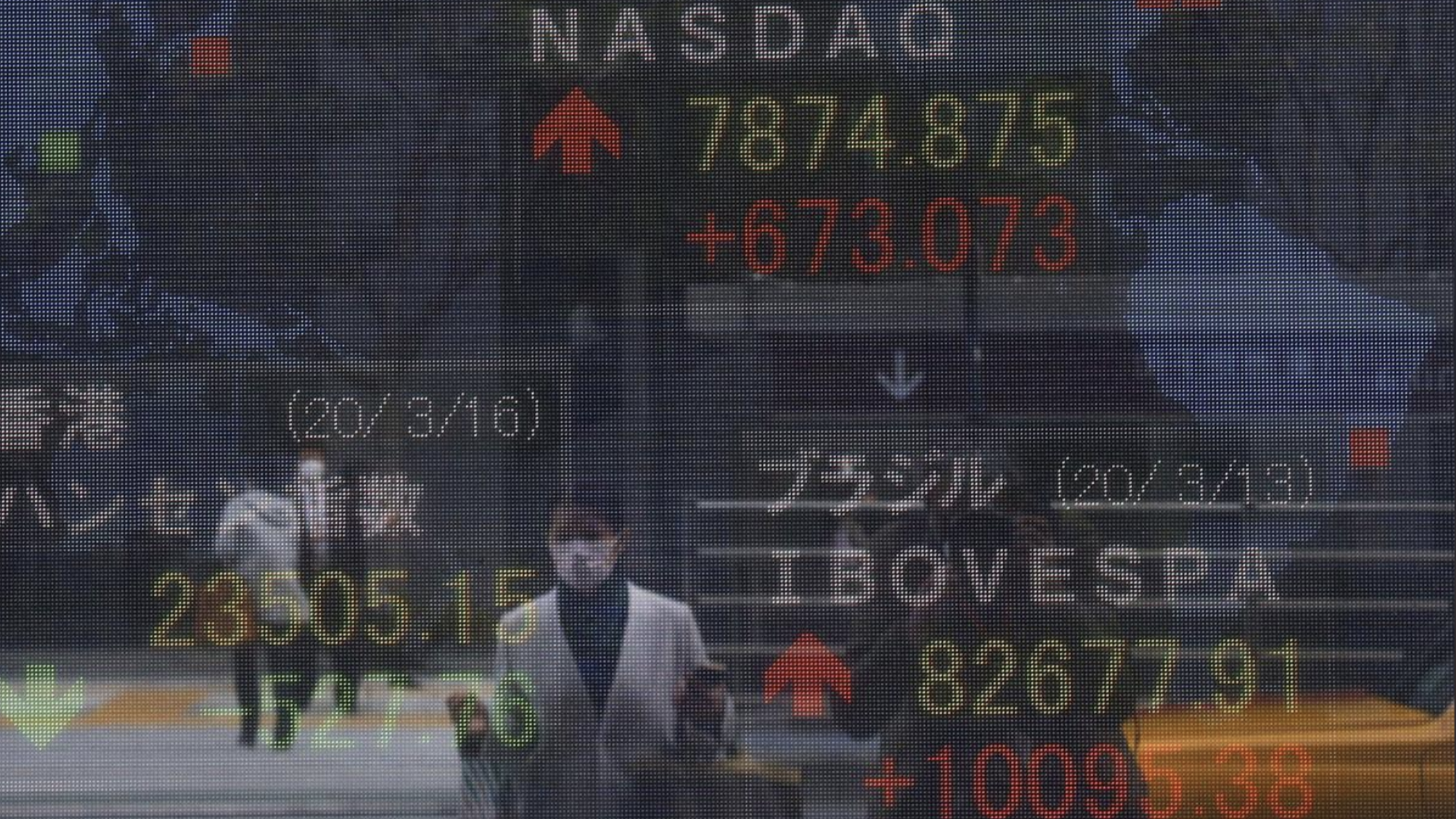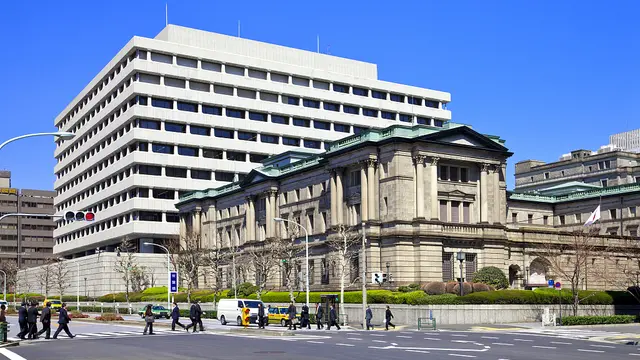The Bank of Japan (BOJ) on Monday unveiled a series of emergency monetary policy measures to shore up the world's third-largest economy, as the coronavirus pandemic threatens a global recession.
In a meeting brought forward by two days, the BOJ said it would double its annual capacity to purchase exchange-traded funds and Japan real estate investment funds, the latest global central bank to take emergency action.
The moves sent Japanese markets whipsawing, with the Nikkei-225 initially surging 2 percent but then falling rapidly back into the red as traders digested the statement.
The bank said it had decided unanimously to "actively" purchase ETFs (exchange-traded funds) and J-REITs (investment funds tied to Japanese real estate) with an annual upper limit of 12 trillion yen (112 billion U.S. dollars) and 180 billion yen respectively.

Bank of Japan headquarters in Tokyo, Japan. /VCG
Seiichi Suzuki, senior market analyst at Tokai Tokyo Research Institute, said: "What's big is 12 trillion yen of ETFs buying, which means one trillion yen each month. What investor could ignore this?"
"It was quite a drastic step," Suzuki told AFP."Those who wanted to buy jumped on the occasion."
Previously, the bank was buying a maximum of 6 trillion yen of ETFs and 90 billion yen of J-REITs per year.
The BOJ said it would also introduce a new operation to provide loans against corporate debt and raised its annual limit for corporate bond purchases by 1 trillion yen to 4.2 trillion yen.
But it left its main interest rate unchanged at minus 0.1 percent and also kept its upper limit for purchasing government bonds at 80 trillion yen.
"There have been significant uncertainties over the consequences of the outbreak of COVID-19 and over the size and persistence of their impact on domestic and overseas economies," said the bank in a statement.
BOJ chief Haruhiko Kuroda said hours afterwards that the body expects the impact of the virus to "continue for some time".
"There are so many uncertain factors. It is necessary that we continue to fully monitor the economic situations at home and abroad," he added.
"Coronavirus or not, if there is downward pressure on the economy and prices, we will consider additional monetary easing measures to deal with it."
Stocks sink despite the measures
Tokyo stocks slid to their lowest in three and a half years on Monday despite the Bank of Japan's emergency pledge to boost buying of Exchange Traded Funds (ETF) by up to double current levels failed to calm investor nerves.
The BOJ move, announced in statement after an emergency meeting, came as global central banks step up efforts to combat the widening economic fallout from the coronavirus epidemic.
The benchmark Nikkei average skidded 2.5 percent in choppy trading to finish at 17,002.04, its lowest closing level since November 2016.
The Nikkei's volatility index, a measure of investors' volatility expectations based on option pricing, jumped 17 percent to 60.03, its highest level since March 2011 when massive earthquakes and a tsunami struck Japan.

A woman a wearing protective face mask, following an outbreak of the coronavirus disease (COVID-19), is reflected in a screen displaying NASDAQ movements outside a brokerage in Tokyo, Japan March 16, 2020. /Reuters
"The market is no longer reacting to each step the BOJ is taking, looking at whether any of them work. Rather, markets are reacting negatively because they have lost confidence in the BOJ," said Yasuo Sakuma, chief investment officer at Libra Investments.
"Now it's obvious that the BOJ has no card left to play."
Olympics fears
Prime Minister Shinzo Abe welcomed the measures as "swift and appropriate". He is due to talk with other G7 leaders in an extraordinary summit held via teleconference later Monday.
The BoJ's move followed emergency measures before Asian markets opened from the
U.S. Federal Reserve
to shore up confidence and keep the financial sector running, including slashing its key interest rate to virtually zero.
The Fed made its second emergency rate cut in less than two weeks, lowering the benchmark borrowing rate to a range of 0-0.25 percent, where it was during the 2008 global financial crisis.
The Japanese economy was tottering even before the coronavirus struck, with growing fears of a recession. "Japan's economic activity is likely to remain weak for the time being, mainly affected by the outbreak of COVID-19," the BOJ said.
The country's gross domestic product for the October-December quarter contracted 1.8 percent, with consumer spending hit by a hike in consumption tax last October from eight to 10 percent.
Concerns are growing that consumption will be hit even harder as people put off big purchases because of coronavirus fears, with the pandemic also predicted to have a huge impact on exports.
On top of this looms the possibility that the Olympic Games, scheduled to open on July 24 in Tokyo, could be postponed or cancelled.
Estimates vary on what that could cost Japan, which is spending an estimated 1.35 trillion yen on Tokyo 2020. Any change to the Olympic schedule would have a huge impact on tourism -- Japan was banking on 40 million visitors in 2020.
Economists at research firm Nomura already predict a 0.7-percent contraction in GDP for the 2020 calendar year, but warn that could be up to 1.5 percent if the Games are cancelled.
Monday's measures "will contribute to supporting economic and financial activities", said the bank.
(With inputs from AFP and Reuters)
 简体中文
简体中文

